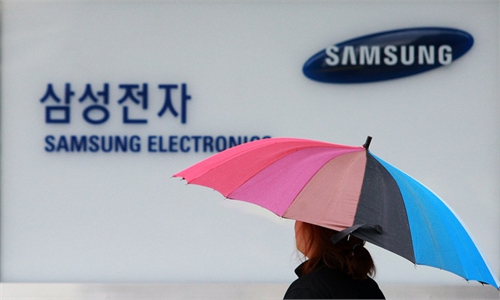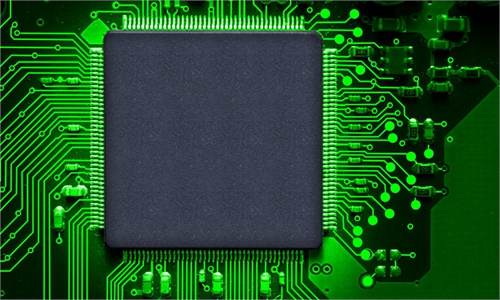
chip Photo:VCG
The US government, following a year's meticulous planning, has crafted a new law to heavily subsidize America's private semiconductor manufacturers. Billed as the CHIPS and Science Act which US President Joe Biden signed a week ago, the law would provide a total of $52.7 billion for American semiconductor research, development, manufacturing and workforce development.The White House, in a statement, boasts the new law will help lower American production costs, strengthen its own supply chain, as well as counter China's rise. A key provision of the act imposes limits on advanced semiconductor production in China for subsidy recipients.
Like all recent US legislation meant to address its supply chain anxiety, the most prominent behind-the-scenes driver of the act is China. Or more precisely, fear of China.
The US Department of Commerce has yet to establish detailed guidelines for evaluating grant applications, and it is unclear when projects will be financed by the new act. The mainstream American media have praised the act as a measure to help create many good-paying jobs within America's shores, while the law may "disrupt and subdue" China's technological advance in the coming months and years.
Not necessarily. China, a major manufacturing powerhouse which maintains substantial commerce and trade relations with nearly all the economies, big or small, in the world, will not wait idly to be excluded from the global semiconductor supply chain. It is believed the Chinese government and engineers will ramp up their efforts to strengthen innovations.
Yes, the US law will only force Chinese scientists and technicians to come up with even greater indigenous innovation to catch up with the world's leading chip manufacturers.
Currently, East Asia, including China's Taiwan and South Korea, lead the US and Europe in critical technology innovations related to microchips manufacturing. China's mainland market has consumed up to 40 percent of global output of semiconductor microchips, which explains why the world's major chipmakers are accelerating their investment in the mainland because the top market is located here. Another important factor is China has tens of thousands of well-educated, relatively young, and inexpensive workers, and these advantages cannot be easily found in other continents.
Feeling threatened by the East Asia Chips Prevalence, the Biden administration has been keen since its inauguration to reduce America's dependence on this region for a critical technology. To be specific, Washington politicians very much want to chip away at the distinctive strength of Samsung and TSMC, which the two ventures have been building over the past many years.
In a sense, the CHIPS and Science Act is a best testament of American calculation and skullduggery.
In addition to weakening East Asia's chips-making capability, the US law also reflects the Biden administration's ignominious idea of "decoupling" from China, and specifically, Chinese technology and Chinese manufacturing. The White House said the law will strengthen American supply chains and help maintain the US' leading status across the industries of future, including nanotechnology, clean technology, quantum computing and artificial intelligence. Aren't Chinese enterprises now leading most of the research and development of these technologies?
For quite a long time, the world has looked to synergy between US and China, including proper coordination on macro and industrial policies and mutually beneficial nature of working together to help preserve stable global industry and supply chains.
However, the Biden administration, skittish about China's emergence and even surpassing of the US in economy and global influence, has taken a U-turn, bucking the historic trend of cooperation, and started to contain and impede China's growth.
Publically, the Biden administration has claimed before the world press that it does not seek to contain China's development, but the claim rings hollow. In practice, his administration has placed dozens of high-tech Chinese companies, such as Huawei Technologies and SMIC, on the American government's Entity List that bars exports of US technology to the "blacklisted" companies - which Chinese industry watchers call "technological terrorism".
And, by defining China as a strategic competitor, the Biden administration inherited the tariffs war from his predecessor Donald Trump, and intensified the fight. After all, it is American consumers that have borne the brunt of the real-world consequences of their politicians' reckless pursuit of trade and economic decoupling from China.
The Biden administration is certainly intent on engaging in a zero-sum game, but as the saying goes: those who seek to block the way of others will only end up blocking their own way. By constantly politicizing and weaponizing trade and economic issues, Washington is only demonstrating to other countries the risks of dependence on the US, spurring them to look elsewhere.
The author is an editor with the Global Times. bizopinion@globaltimes.com.cn



